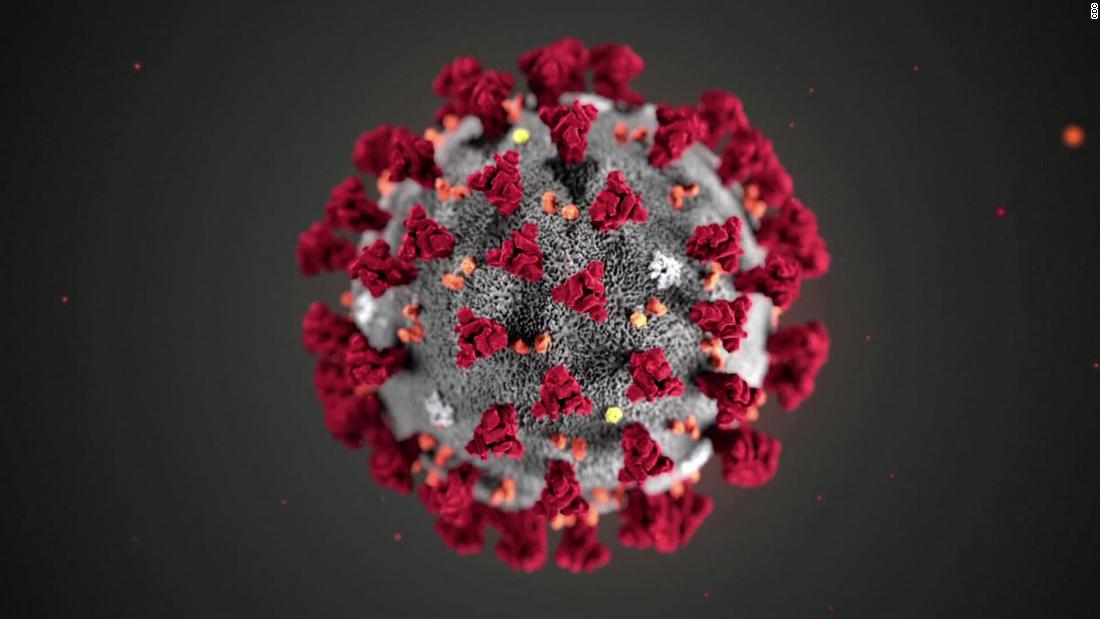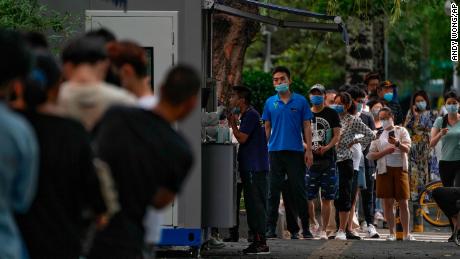
What you need to know about new Omicron offshoot
July 13, 2022This is the weekly edition of CNN’s coronavirus newsletter. Look out for your roundup every Wednesday. If you haven’t subscribed yet, sign up here.
(CNN)Nearly two-and-a-half years since the coronavirus pandemic began, the most infectious and transmissible variant yet has arrived.
Repeated Covid-19 waves have left millions of people dead, with only vaccines helping to blunt the toll. Now the virus is spreading again — evolving, escaping immunity and driving an uptick in cases and hospitalizations. The latest version of its shape-shifting, BA.5, is a clear sign that the pandemic is far from over.
The newest offshoot of Omicron, along with a closely related variant, BA.4, are fueling a global surge in cases — 30% over the past fortnight, according to the World Health Organization (WHO).
In Europe, the Omicron subvariants are powering a spike in cases of about 25%, though Dr. Michael Ryan, the executive director of WHO’s Health Emergencies Program, has said that number may actually be higher, given the “almost collapse in testing.” BA.5 is on the march in China, ratcheting anxieties that major cities there may soon re-enforce strict lockdown measures that were only recently lifted. And the same variant has become the dominant strain in the United States, where it accounted for 65% of new infections last week, according to the Centers for Disease Control and Prevention (CDC).
“We have been watching this virus evolve rapidly. We’ve been planning and preparing for this moment. And the message that I want to get across to the American people is this: BA.5 is something we’re closely monitoring, and most importantly, we know how to manage it,” said Dr. Ashish Jha, the White House’s Covid-19 response coordinator, in a news briefing on Tuesday.
On the same day, WHO’s Emergency Committee said Covid-19 remained a Public Health Emergency of International Concern — its highest level of alert, first declared on January 20, 2020 — amid rising cases, ongoing viral mutation and increasing pressure on already overstretched health systems. In a statement, the committee, which is made up of independent experts, highlighted challenges to the ongoing global Covid-19 response, including a drop-off in testing and spotty genome sequencing, raising the question of just how accurately any nation might reasonably be able to monitor BA.5.
Official data dramatically undercount the true number of infections in the US, epidemiologists say, leaving the nation with a critical blind spot as the most transmissible coronavirus variant yet takes hold. Some experts think there could be as many as 1 million new infections every day in the broader US population — 10 times higher than the official count.
As for how to manage the new wave, Jha urged Americans aged 50 and older to get second booster shots. Adults who are up to date with vaccinations are less likely to be hospitalized than those who are unvaccinated. But only about one in four adults in the US over 50 have gotten their recommended second boosters, data collected by the CDC show.
US health officials are urgently working on a plan to allow second Covid-19 boosters for all adults, a senior White House official confirmed to CNN on Monday, amid fears that younger adults’ immunity may be waning as Covid-19 cases rise with the dominance of BA.5.
What makes BA.5 different? Eric Topol, a cardiologist and professor of molecular medicine at Scripps Research, has called BA.5 “the worst version of the virus we’ve seen.” He explained in a recent newsletter: “It takes immune escape, already extensive, to the next level, and, as a function of that, enhanced transmissibility,” well beyond earlier versions of Omicron.
In other words, BA.5 can easily evade immunity from previous infections and vaccines, increasing the risk of reinfection. Though the variant does not appear to lead to more severe illness, in an interview with CNN on Monday, Topol said that given the extent of BA.5’s immune evasion, he expects to see an escalation in hospitalizations, as we’ve seen in Europe and elsewhere that the variant has taken root. “One good thing is it doesn’t appear to be accompanied by the ICU admissions and the deaths as previous variants, but this is definitely concerning,” he added.
Public health experts in the US may take some solace from the trajectory of the variant in Europe. WHO’s Ryan said last week that while many European countries are experiencing a jump in hospitalizations, “what we’re not seeing is an increase in intensive care unit admissions, so the vaccines are very much still working and it is those gaps in immunity that are causing the problem.”
But still, steep reductions in Covid-19 surveillance worldwide are hindering epidemiologists’ efforts as they race to trace the virus’ evolution.
“Sub-variants of Omicron, like BA.4 and BA.5, continue to drive waves of cases, hospitalization and death around the world,” WHO Director-General Tedros Adhanom Ghebreyesus said in a media briefing on Tuesday. “Surveillance has reduced significantly — including testing and sequencing — making it increasingly difficult to assess the impact of variants on transmission, disease characteristics, and the effectiveness of counter-measures.”
“New waves of the virus demonstrate again that the Covid-19 [pandemic] is nowhere near over,” he added.
YOU ASKED. WE ANSWERED.
Q: How should I protect myself amid the new Covid-19 wave?
A: At this point in the pandemic, many people may not want to plan their lives around Covid-19 anymore — especially if they’re generally healthy. On the other hand, those with underlying health conditions or who have concerns about long-haul symptoms are still trying to play it safe. Given just how contagious the new Omicron subvariants are, avoiding infection does require some planning and consideration, CNN Medical Analyst Dr. Leana Wen explains.
“I don’t think that most people should have to change their daily activities, but I do think people need to be aware of their risk of contracting Covid-19 if they don’t take additional precautions,” Wen said. The question to ask yourself, she added, is this: How much do I want to continue to avoid infection?
For individuals who want to reduce their risk, Wen advises that they stay up to date with their boosters (in the US, everyone age 5 and older can receive a first booster, and those 50 and older can receive a second booster for a total of four shots). She also recommends wearing a high-quality N95 mask or equivalent in indoor, crowded settings, and staying outside for large gatherings as much as possible — something easier to do in the summertime.
“For those who find masks uncomfortable, I’d encourage mask-wearing in the highest-risk settings — for example, mask while in a crowded security line at the airport and during boarding and deplaning,” she said.
Send your questions here. Are you a health care worker fighting Covid-19? Message us on WhatsApp about the challenges you’re facing: +1 347-322-0415.
READS OF THE WEEK
First Covid vaccine mandate enforced in mainland China
Beijing last week announced a Covid-19 vaccine mandate for residents wanting to enter public venues, becoming the first city in mainland China to do so as it attempts to contain the spread of BA.5, Nectar Gan writes. Those who are “not suitable” for vaccination will be exempt from the requirement, a city official said, without clarifying how they can provide the proof needed for exemption.
The vaccine mandate comes as Beijing reported three cases of the highly contagious Omicron subvariant. Several Chinese cities have imposed new curbs after detecting BA.5. Shanghai, which only recently emerged from a two-month lockdown, identified its first case on Friday and will perform two rounds of Covid tests this week. An outbreak of BA.5 has already shut down the northwestern city of Xi’an, home to 13 million people, where entertainment, sports and religious venues have been closed, and restaurants limited to takeaway and delivery services.
Casinos in the gambling hub of Macao were ordered to shut for the first time since February 2020 because of a Covid outbreak, sending shares of their operating companies plunging, and fears of new lockdowns in Shanghai undermined the broader China market. Chinese stocks remained under pressure after Monday’s sell-off fueled by the threat of new Covid restrictions, especially the tech sector, Laura He reports.
Drug-resistant infections and deaths have risen among hospital patients
The US had made significant progress in fighting drug-resistant infections in recent years. But those gains were largely erased during the Covid-19 pandemic, with hospital-acquired infections and resulting deaths rising 15% in 2020, according to new data, Deidre McPhillips reports.
A special report released Tuesday by the CDC found that more than 29,400 people died from antimicrobial-resistant infections in the first year of the pandemic — nearly 40% of those deaths were among people who got the infection while in the hospital. The full number is probably even higher, given that data for half of the 18 pathogens identified as threats are unavailable or delayed.
WHO has called antimicrobial resistance a “silent pandemic,” and drug-resistant infections were linked to nearly 5 million deaths globally in 2019. The Covid-19 pandemic probably contributed to the increased risk in the US, particularly because many people delayed care or left infections untreated — either because of closed clinics or fear of exposing themselves to Covid-19 — which can increase the risk of developing drug resistance.
Pulse oximeters don’t work as well for people of color
Often when Dr. Thomas Valley sees a new patient in the intensive care unit at Michigan Medicine in Ann Arbor, he clamps a pulse oximeter on their finger — one of the many devices he uses to gauge their health and what course of care they require, whether they are a child having seizures, a teenage car accident victim or an older person with Covid-19.
But recently, Valley, an assistant professor in the University of Michigan’s Division of Pulmonary and Critical Care, realized that the small device may yield less accurate oxygen readings in patients with dark skin. If the device isn’t calibrated correctly, the darker pigmentation can affect how the light is absorbed by the sensor, leading to flawed oxygen readings and patients being discharged when they shouldn’t.
The findings of Valley and his colleagues add to a growing body of research — dating back to the 1980s — that suggests flawed pulse oximeter readings among Black and brown patients can be a real and life-threatening issue in medical care. But the public has only recently been made more aware of this health disparity, and US health officials have announced plans to investigate the accuracy of pulse oximeters, Jacqueline Howard reports.
TOP TIP
Advice for anxious new moms
Edith Bracho-Sanchez, director of pediatric telemedicine and assistant professor of pediatrics at Columbia University Irving Medical Center, didn’t think she’d be an anxious mom. But that changed when she had her son. “I stress over every decision I make for William. I make long pro and con lists, I discuss everything with my partner, sleep on things and ultimately, I pray,” she wrote in a recent column for CNN.
Knowing how difficult it is to make decisions — big and small — she said she understood why some parents might struggle with the choice to vaccinate their children against Covid-19. This is why she says she did it, and her advice to anxious new moms like her:
- First, Covid-19 is an unpredictable illness. While most children have minor symptoms and recover well, many have landed in hospitals and emergency rooms, and to date, more than 400 children under the age of 5 have died from the illness in the US alone, according to the CDC. We also don’t yet fully understand the long-term effects of the disease.
- Second, I know the vaccine is in the body for a short period of time and with a specific mission. It instructs the body to make protective antibodies against Covid-19, and the body’s own cellular mechanisms quickly break it down soon after. Because of this, there really is no plausible way it will interfere with my little William’s development, something about which I am constantly thinking.
LISTEN TO OUR PODCAST
We’re always waiting for something, whether it’s in line for our morning coffee, on hold with customer service, or the next Covid-19 booster shot. How can we make it feel less excruciating? CNN’s Chief Medical Correspondent, Dr. Sanjay Gupta, talks with waiting expert Professor Kate Sweeny to understand the science of waiting, why we evolved to hate it, and what we can do to deal with waits in our day-to-day lives. Listen here.
Source: Read Full Article



